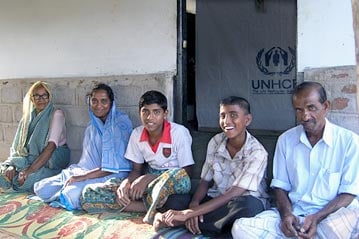Post-tsunami housing crisis brings split couple happily together again
Post-tsunami housing crisis brings split couple happily together again

AMPARA, Sri Lanka, December 27, (UNHCR) - "We lived happily together for 19 years before the break up. Now we're back together, it's just like the old days," said Faleela Hameed, recently reconciled with her husband, M.I Mohamed Mubarak.
Now living together with their four children in a UNHCR transitional shelter in Chavalakadai, Ampara District on Sri Lanka's east coast, the couple had been separated for nearly ten years since the mid-1990s. But with the help of UNHCR and the Rural Development Foundation (RDF), Faleela and Mohamed put aside their differences and started again from where they had left off.
The events which led to their reunion began with the devastating tsunami of December 2004. Ampara was the district of Sri Lanka most severely affected by the disaster which claimed the lives of Faleela's mother, sister and niece.
Finding shelter in government buildings and on private land, Faleela spent the first few months after the tsunami trying to come to terms with the loss of her relatives. The next step was to try to get a degree of normalcy in her life. Key to this process was to find accommodation from which to rebuild her life.
Faleela's eldest son, who was living with his father, had heard that temporary shelters were available from UNHCR. He got a registration card so his mother could join them on the list of beneficiaries.
"RDF came to me asking why our family had applied for two shelters, so I explained that my husband and I had been separated for many years," said Faleela. "They said this is no good, you must unite for yourselves and the children. I told them it was too late for all that, but they persisted in trying to bring us together," she added.
RDF is UNHCR's main partner in Ampara, and is helping in the construction of nearly 3,000 UNHCR transitional shelters for tsunami-affected people in the eastern district.
A crucial player in bringing Mohamed and Faleela back together was Thaya Mayilvaganam, an RDF psychosocial counsellor.
"I tried many times to get them to speak to each other, but both were very stubborn. I was ready to give up at one point, but Faleela's neighbours pleaded with me to keep trying," said Thaya. It took some time, but her efforts were not in vain.
"I heard that Faleela had gone to visit her husband and children," Thaya reveals. "I went to see her a few days later and she had all her things packed and ready to go. I asked her where she was going, and she told me she had finally decided to move back in with her husband. They all seem so happy together now. It's wonderful."
Mohamed says the local community has been very supportive. "Our neighbours have been visiting us constantly, passing on their best wishes and congratulating us." He still cannot quite believe what has happened. "I didn't think we could get back to how things were, not after so long apart. But look at us now," he said. "It must be fate."
After being reunited for two months Mohamed, Faleela and their four children are now looking optimistically to the future. They have constructed an extension to their temporary shelter, are growing their own vegetables and their son is building a small kitchen area from surplus building materials.
Like many others displaced by the tsunami, Faleela is facing documentation problems. "I built a house on land owned by my mother, who promised to transfer the deeds to me," she declared. "Then the tsunami washed away everything we had, and now I have no proof of ownership." Faleela now wishes to give the land to her unmarried sister, and is trying to obtain new documentation from the authorities.
The refugee agency has set up a programme together with the Sri Lankan government to help survivors recover lost documentation such as birth, death, and marriage certificates, as well as land and property deeds. As part of this initiative, UNHCR Sri Lanka has organised more than 20 legal clinics in Hambantota, Galle, Ampara, Batticaloa, Mullaitivu and Kilinochchi Districts, to ensure the replacement of personal identity documentation lost or destroyed in the tsunami.
As fears of another tsunami are still rife in many coastal communities of Sri Lanka, Faleela and Mohamed are both relieved to be now living further inland. But this has reduced their employment prospects in a district which relies heavily on the fishing industry. Mohamed is currently working as a casual labourer, while the family is also sustained by his mother's pension.
With nearly all temporary shelters built and 95% of needs met, the focus for those involved in the shelter sector is beginning to shift from construction to care and maintenance. This is essential to ensure the longevity of transitional shelters while tsunami survivors await permanent homes. Practical considerations such as site management, access to adequate services such as health care and education are part of care and maintenance.
In a place which has suffered so much, there are now smiles on the faces of Faleela and Mohamed. Their son Sibly (15) watched as his brother built the new kitchen. He said he wants to be an engineer when he grows up. "You'll make a good engineer, always standing around while someone else does all the work!" his father joked.
By Lyndon Jeffels in Ampara, Sri Lanka








